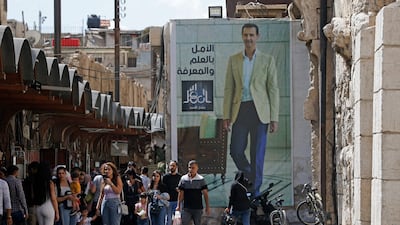Interpol's move to resume co-operation with Syria will strengthen the regime's campaign of intimidation against refugees and dissidents living in exile in the Middle East and Europe.
Syrian activists believe the collaboration between Damascus and the global policing body will allow President Bashar Al Assad and other officials from Syria's notorious intelligence services and security apparatus to continue to crack down on dissenters outside Syria.
Interpol’s executive committee this week decided to give Syria the right to send and receive messages from other member countries again, at a recommendation from the Secretariat General, in the first step to resuming co-operation with the country.
The organisation suspended Syria's access rights in 2012, months after civil war grew out of a popular uprising against Mr Assad, in what the France-based body called a "corrective measure". Syria has been a member country of Interpol since 1953.
“It’s unfortunate that Interpol has reinstated co-operation with the Syrian regime, which has committed large-scale crimes against humanity and pursued tactics to crush any form of dissent,” said Fadel Abdul Ghany, founder of the Syrian Network for Human Rights.
“Re-adding the Assad regime to the database of Interpol, which has 194 member states, again will enable it to hunt down dissidents. Panic spread among Syrian refugees and must have been reverberated around Syrian communities in exile,” he told The National from the Qatari capital Doha.
Interpol says member countries maintain full control over the data they provide to Interpol and decide which of the organisation's regional offices – known as National Central Bureaux – get to see their information.
An Interpol spokesman sought to downplay fears that the regime could exploit access to global policing information to target dissidents or refugees.
“This means that NCB Damascus can only access information in Interpol’s databases that has not been restricted by other member countries,” he told The National.
‘Red notices can be abused’
Since the start of the civil war in Syria in 2011, activists like Mr Abdul Ghany have been documenting atrocities in the country and accused Syrian government forces and state-sponsored militias, known locally as Al Shabiha, of being behind them.
They supplied evidence to some European countries, such as Germany, which apply universal jurisdiction, allowing them to investigate human rights abuses committed abroad and prosecute individuals for war crimes committed outside their own borders.
A German court last February sentenced a former Syrian intelligence officer to four and a half years in jail for complicity in crimes against humanity.
Prosecutors argued that the man, identified as Eyad Al Gharib, had helped to arrest demonstrators taking part in the 2011 anti-government protests and who were later tortured and murdered.
Another former Syrian intelligence officer, Anwar Raslan, is on trial. Both fled Syria's civil war and were given asylum in Germany – but were arrested in 2019 after they were recognised by other Syrians.
Restoring the Assad regime's access to Interpol raises fears over the potential misuse of the global policing body's red notices, which are usually used to notify international police forces to locate and arrest wanted criminals.
Activists are concerned that Damascus could use red notices to pursue its opponents outside Syria's borders. There are also fears that those wanted by the Syrian authorities might be tortured or killed if they were ever extradited to Damascus.
The Interpol spokesman said: "A dedicated multidisciplinary task force at Interpol’s General Secretariat headquarters conducts a compliance review for all red notice requests.
“This review takes into account information available at the time of publication, and a notice is only published if it complies with the organisation’s constitution, under which it is strictly forbidden for the organisation to undertake any intervention or activities of a political, military, religious or racial character. Whenever new and relevant information is brought to the attention of the General Secretariat after a red notice has been published, the task force re-examines the case.”
Human rights activists and lawyers, however, say that lifting a red notice is not a straightforward process and might take many months even in democracies like Germany and France, which both investigated war crimes allegedly committed by the Assad regime over the past decade.
According to Interpol’s founding charter, all member countries are informed about the non-compliance of a notice and are asked to update their national databases accordingly.
The organisation cannot demand that action be taken on a notice, and whether to do so is at the discretion of each member country.
“Red notices can be abused by any autocratic regime like the one in Damascus. I’m afraid to say that this normalisation step with Assad will consolidate his powerbase and he may never face justice,” Mr Abdul Ghany said.














